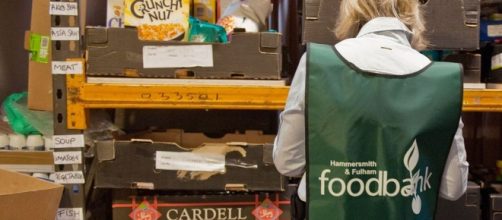Last year, we learned that over a million people living in Britain relied on food banks to survive. We may have stopped talking about it, but that figure isn't decreasing. In fact, it's on the rise. Considering how last year's statistics shocked the nation, what does it now say about Britain that the number of people reliant on food banks is still growing? How can one of the world's most developed states suffer from such a rate of Poverty?
The Numbers
According to the latest figures from the Trussell Trust, the UK's largest food bank provider, the number of people given three-day emergency food supplies has increased two percent from last year to 1,109,309.
Comparing this to the statistics from 2009 where 25,899 people visited a food bank makes for a stark and depressing revelation. Even more shockingly,over 400,000 of thosewho have visited them in the past year are children.
Causes for referrals.
The latest figures from the Trussell Trust show thatthe primary reasons people go to food banks are varied. Most often, it is due to delays and changes in benefits, low income, homelessness, unemployment, disability, domestic violence and debt.
Since the rise in the minimum wage was announced last year, the number of people seeking food banks due to benefits has decreased, but this has had little effect on numbers, as the numbers of people seeking referrals due to low income have increased.
In an age where the Conservative government is preaching 'social mobility' as gospel, more and more people are faced with fewer benefits, more low-income jobs, and zero-hour contracts. Furthermore, more disabled people are being deemed 'fit-to-work' than ever, cutting their benefits and heightening reliance on food banks. At the heart of Conservative policy lies thenotion that poverty is psychological, not material: thatpoverty is the state of mind for those who do not have the wherewithal to find work and aspire to a better life.The numbers from the Trussell Trust prove otherwise.
Poverty in the North
Statistics measuring the use of food banks show sharp differences between regions of the UK.
By far the most affected are areas in the north of England and in Scotland. In the 2015-2016 financial year,160,048 people used food banks in the North East of England and 133,726 people used them in Scotland where food bank use is disproportionately higher than in any other area in the UK.
A 2014 report by Sheffield University found that northern areas were hardest hit by local government funding cuts under the Tory austerity program. In Scotland, the downturn in the oil and steel industries have affected unemployment and low-income figures. The promises of reinvestment in a 'northern powerhouse' are yet to materialise, and until they do, it seems unlikely that the north will be any less reliant on food banks.
The shame of Britain
In one of the world's most developed countries, and one that learned its lesson from the injustice of poverty during the Victorian times, the increase in the use of food banks is unacceptable. This is particularly true when we consider at the arrival of refugee children in the coming weeks, and what we can offer them as a nation. The war on 'benefits cheats' and 'scroungers' has seriously affected cultural attitudes towards poverty and made the UK a less caring place. Where we should have focused our energy on attempting to make food banks obsolete in the past year, we have thrown away a third of our food, ridiculed those on benefits and let the problem fester, only to re-elect a government that has done nothing about the problem.
It's only when all of us can truly view those who use food banks with compassion and foster a sense of community that food banks will disappear. Yet sadly, in post-Brexit Britain, we are becoming more fragmented and indifferent than ever.

